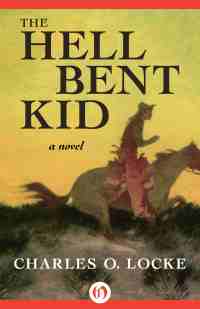The Hell Bent Kid by Charles O. Locke
 Friday, November 6, 2015 at 9:51AM
Friday, November 6, 2015 at 9:51AM 
First published in 1957; published digitally by Open Road Media on July 7, 2015
The Western Writers of America put The Hell Bent Kid on its list of the 25 best westerns ever written. I’m not sure whether I’ve read 25 westerns in my entire life, so I’m in no position to judge. The Ox-Bow Incident and Pale Horse, Pale Rider remain my favorites, but The Hell Bent Kid is a worthy addition to that list. It is a story of what passes for justice in the Old West, but it focuses upon the changes a young man undergoes as he encounters unremitting violence. I suppose it is a kind of coming of age story, but the young man seems destined to see very little of his adulthood.
Tot Lohman, only 18, is released from custody to work on a ranch. Lohman killed Shorty Boyd in self-defense, but he expects the Boyds to seek revenge and he wants to get it over with so he gets the rancher’s permission to leave. He plans to find his father, a former lawman who is now cooking for some cattle rustlers, but encounters obstacles during that quest, most of them involving the Boyds. From conversations Lohman has along the way, we learn quite a bit about his family, although few of his kin are still alive. It is a harsh land Lohman roams.
Lohman isn’t a typical western hero. His mother was a Quaker and Lohman has inherited her nonviolent nature. Still, he lives in a violent world, he has great skill with a rifle, and he isn’t unwilling to defend himself. He is a simple man doing his best to understand a complex life. What he comes to understand haunts him. Lohman is “pulled this way and that” as he comes to terms with his destiny.
Much of the story is told in Lohman’s sparse voice. Some of the story is revealed in letters or statements composed by other characters. The landscape and the hardscrabble lives of the people who populate it are vividly drawn. Horses have more value than people, reputation is more important than reality. Dialog and strong characterizations, like the setting, are the novel’s strengths. The change in Lohman’s personality -- he is more confident but less innocent in the novel’s final chapters -- is convincing.
Westerns are often tales of morality. Justice is usually the dominant theme. The characters in The Hell Bent Kid debate law-and-order, some believing that justice (in the form of vengeance) should be meted out by those who are wronged, others advocating the more civilized belief that nothing is less just than inflicting punishment without a trial. “But it’s a tough country, big and tough” one of the characters observes, and toughness is not the best environment for nurturing morality.
Still, there are good and decent people in the novel, the kind who understand the true meaning of law-and-order, the kind who strive to bring moral order to a big and tough country. Unfortunately, the good and decent are always at risk; the powerful too often prevail. All of those realities of life are encapsulated in this brief, stirring novel.
RECOMMENDED